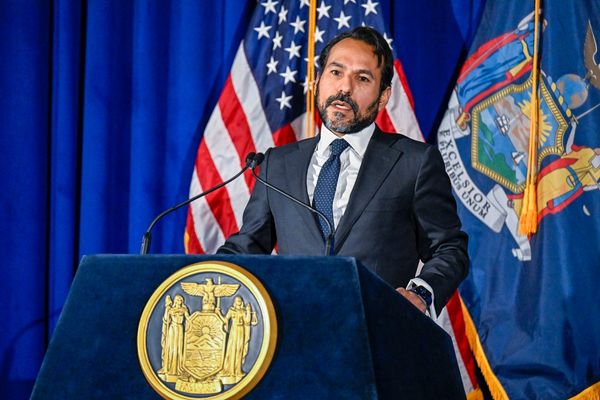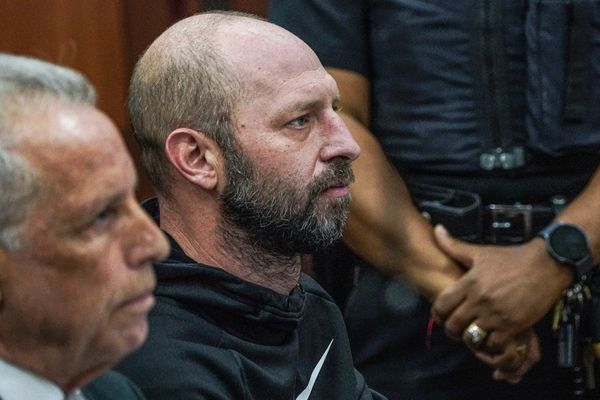Some billionaires are born with a silver spoon in their mouth. Not Thomas Peterffy, founder and chairman of Interactive Brokers.
Peterffy, 80, fled Hungary in 1965 and emigrated to America at age 21. He arrived in New York with little money and no college degree. He couldn't speak English and used a dictionary to memorize words.
After working as a draftsman for a highway design firm, he worked as a computer programmer and saved $200,000.
In 1977, he purchased a seat on the American Stock Exchange and began trading options. Eventually, he developed the first handheld computer used for trading and launched a market-making business.
Following the success of his market-making business, he founded Interactive Brokers in 1993. Today, it's among the largest electronic brokers in the U.S.
"I was a very bad student," Peterffy said. "I'm dyslexic and had trouble in school. So I escaped into daydreaming. As I became an adult, my tendency to daydream continued and I still do that today. But as an adult I daydream about having reached my goals. You must think about your goals all of the time."
Find A Better Way Like Thomas Peterffy
Peterffy's early years in Hungary left a mark. From a young age, he observed the inefficiencies in Hungary's socialist system.
"I think I am lucky to have grown up in a socialist country where inefficiencies were apparent," he said. "I think about the reasons for them and what I would have done differently had that been possible. Coming to America did make that possible. So, I came with a plan in mind of how to become very efficient."
Peterffy: Innovate Your Way To Success
He followed through on his plan — and then some.
Within weeks of joining the American Stock Exchange, he saw an opportunity to automate the trading system to boost efficiency. But when he proposed to exchange officials that they use a computer to streamline trades, they rebuffed him.
As keynote speaker at a Securities Industry and Financial Markets Association conference in 2023, Peterffy cited his accent as another obstacle early in his career.
"If you have difficulty understanding me today, just imagine my problems 46 years ago," he told the audience. "Whenever I wanted in on a good trade, they claimed that they could not understand me."
After hiring floor traders to buy offers and sell bids, he had a brainstorm: design a handheld touch-screen computer to display option values.
"I hired an electrical engineer hobbyist," he recalled in his 2023 SIFMA speech. "While he was building the computer, I wrote the code in a stack language that our simple chip would understand."
In 1982, he founded an electronic options market-making business called Timber Hill to harness automation to increase efficiency.
In 1993, he kept Timber Hill while opening a discount brokerage unit to serve institutions and individual investors. He called the new firm Interactive Brokers.
Focus On Visionary Leadership Like Peterffy
A few years later, Peterffy met Steve Sanders, a bank executive who was working on a new options exchange. Peterffy planned to invest in it.
When the new exchange didn't materialize, Peterffy offered Sanders a job with his nascent brokerage business.
"I asked him if I did a good job at the broker, could I move to Timber Hill?" said Sanders, executive vice president of marketing and product development at Interactive Brokers.
"You wouldn't want to do that," Peterffy replied. "The brokerage is the future."
Be A Great Boss
Sanders took his advice. More than two decades later, he credits Peterffy as a great boss and mentor.
"He's a brilliant visionary who's able to execute on that vision," Sanders said. "Very few people can do both."
After working for a global bank for many years, Sanders was struck by Peterffy's lean management style. Disdaining bureaucracy, Peterffy's direct, no-nonsense leadership resonated with Sanders.
"He encourages you to include just the relevant people to make a decision," Sanders said. "And he has a rule that any analysis (we provide) must have an actual action on it."
Peterffy also models the kind of ethical behavior he wants from his team. Sanders recalls a media interview in which a reporter grilled Peterffy about a technological snafu on the exchange that led to investor losses.
"It wasn't our fault," Sanders said. "But Peterffy said in the middle of the interview, 'We'll make them whole and deal with the exchange ourselves.' He's always doing what's ethical, what the fair thing is to do."
Thomas Peterffy: Rebound From Near Disasters
Reflecting on his nearly 50-year trading career, Peterffy cites two near-disasters that could've crushed him.
After 10 years of saving, in just 30 minutes he lost half his capital in a trade.
"I did a trade that looked like a small trade, but someone else went against me in a big way," he said. "The stock exchange closed and by the time it reopened, my capital was gone."
About 12 years later, he couldn't go to work because of a medical procedure. That same day, United Airlines declared bankruptcy and the market crashed.
"At that time, I had an automated system that was normally profitable," he said. "But in a crashing situation, I wasn't there to stop the system. None of my people realized they should have done that. So by the next day, we had lost most of our capital."
Yet in both cases, Peterffy persevered.
Speak Succinctly Like Peterffy
As a communicator, Peterffy doesn't waste words. He's succinct and to the point.
"I'm always very straightforward," he said. "I try to say a few words but the message is clear. I often think people use many more words than they need."
David Iles can attest to Peteffy's brevity. When Iles, a longtime executive at Interactive Brokers, interviewed for a job in 1986, Peterffy was quick and decisive.
"I responded to a random job ad," Iles said. "My interview with him lasted five to 10 minutes. Then he said, 'You can have the job if you'd like and here's the pay.' That was it."
Mind The Details
Over the years, Iles has noted his boss's attention to detail. In the 1980s, he remembers how Peterffy would spend evenings poring over the list of every trade made that day.
"He'd take it home with him, see if the system was doing what he expected it to do," Iles said. "Then he'd deliver to us first thing in the morning any changes we needed to make" to improve the system.
Iles also admired how his boss handled mishaps. Instead of rushing to point fingers, Peterffy focused on solutions.
"Instead of saying, 'Who's to blame for this loss?' he focused on what went wrong and how can we plug gaps in the system so it doesn't happen again," Iles said. "It was safe confines to work with him."
Thomas Peterffy's Keys:
- Founder and chairman of Interactive Brokers, among the largest electronic brokers in the U.S.
- Overcame: Emigrating to America at 21 unable to speak English with little money and no college degree.
- Lesson: "In my view the next 50 years will be all about adding new products and making them cheaper and more attractive."







